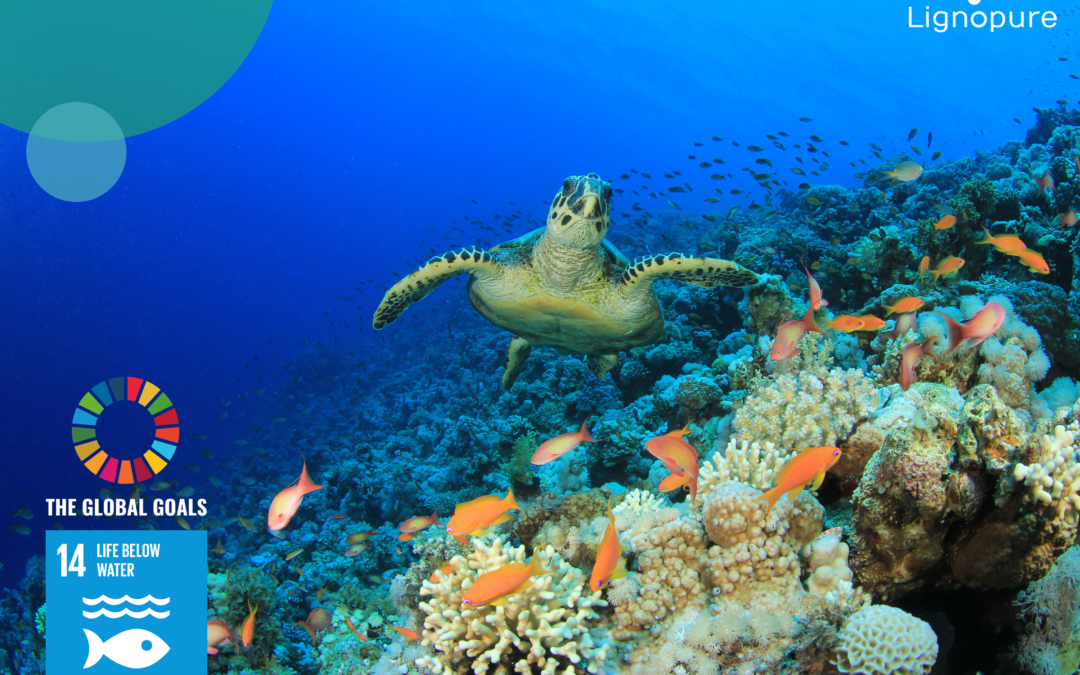
Written by: Joana Gil Chavez – CEO at Lignopure
There is a vast amount of information circulating about the negative effects that Sunscreen ingredients have on our health and our environment, particularly in aquatic ecosystems, however, this information needs to be handled cautiously, and its veracity must be carefully reviewed.
The negative effect of chemical UV-filters
One thing is undeniable, coral reefs are facing degradation around the globe and this has been attributed to the increasing amount of cosmetic UV filters entering the water as well as coastal development, climate change and other pollution sources. These negative effects have been particularly worse in areas with high tourism traffic, where these chemicals can enter the ocean through swimming, washing off sunscreen in the shower, or by simply entering the water from the skin. Once in the environment, they can then harm coral reefs, marine life, and the overall health of the ocean, where the exposure of corals to those pollutants has been observed in the water, ocean sediments, and in the tissues of aquatic creatures1,2. A recent report by the National Academies of Sciences, Engineering, and Medicine describes the challenges of assessing how UV filters might impact ecosystems and the lack of or limited toxicity data for many species. With this, researchers urge the U.S. Environmental Protection Agency to conduct an ecological risk assessment of UV filters found in sunscreens to understand their impact on aquatic environments.
As a result of pressure from environmental groups and consumers who are increasingly conscious of the products they buy and put on their bodies, in the past years, only in the US, several sunscreen ingredients have been banned. Among the list of ingredients that have been found harmful, we can find oxybenzone, homosalate, octisalate, octocrylene and avobenzone, which have been linked to adverse health effects on humans like hormone disruption and skin allergy, as well as causing coral bleaching, which is when the coral expels the algae that lives within it and provides it with its color and nutrients. This makes the coral more vulnerable to disease and can eventually lead to its death. These chemicals can also disrupt the growth and development of other marine organisms, including fish and sea urchins. Today only Titanium Dioxide and Zinc Oxide (in their non-nano form) are considered safe and effective according to a classification published in 2019.
The cosmetic industry and the need for cleaner ingredients
Moreover, the increasing scientific literature (and non-scientific information spread on the internet) pointing to UV filters as a threat to human and environmental health, combined with the rising of the clean beauty movement add great pressure on the cosmetic sector. Ingredient manufacturers now need to double their innovation efforts to identify natural raw materials to create new and safer plant-based ingredients. At the same time, cosmetic companies must reformulate their cosmetic products to use these new ingredients to be compliant with new cosmetic sustainable requirements and natural regulations. Additionally, in the sun care area, products need to prove safe for human health and have little to no environmental impact, while still protecting our skin from solar radiation.
LignoBase, a biobased option to fossil-based UV-filters
At Lignopure, we are very aware that plant-based and biobased does not necessarily mean safe or non-toxic, but we are committed to ensuring that our raw materials come from the most ethically and clean sources we can have, that our processes are constantly optimized to then resulting in ingredients that have the least environmental effect when landing in the oceans and zero negative health effects impact on end users.
In brief, we are very thrilled to be the first company to bring not only a plant-based multifunctional ingredient line but a lignin-based cosmetic line to the market which can reduce the use of chemical UV filters in multiple formulations. Ongoing research in our team will lead to specific replacement and impact numbers from our products in the environment, with this we will provide our customers the tools and trust to use LignoBase in formulas that are reef safe. Each of our LignoBases offers a great variety of valuable skin protective properties, including an SPF boosting effect which increases the SPF skin protection of sun care formulations while not being absorbed into the human skin, following the guidance by the FDA on topical active ingredients and EU safety regulations for cosmetic ingredients and percutaneous absorption.
Join the green revolution and let Lignopure and LignoBase naturally improve your personal care formulations.
References
1 National Academies of Sciences, Engineering, and Medicine. 2022. Review of Fate, Exposure, and Effects of Sunscreens in Aquatic Environments and Implications for Sunscreen Usage and Human Health. Washington, DC: The National Academies Press. https://doi.org/10.17226/26381
2https://icriforum.org/documents/impacts-of-sunscreens-on-coral-reefs/
2022 Lignopure All rights reserved

